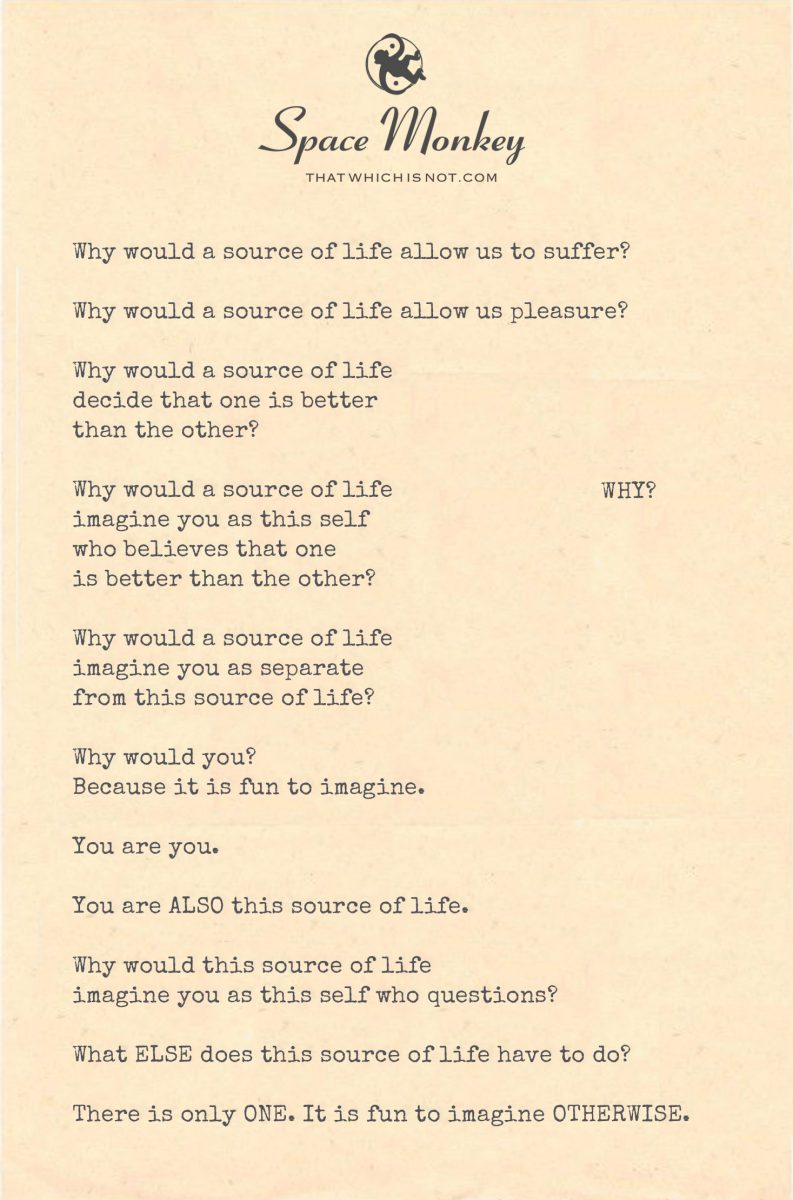
Why would a source of life
allow us to suffer?
Why would a source of life
allow us pleasure?
Why would a source of life
decide that one is better
than the other?
Why would a source of life
imagine you as this self
who believes that one
is better than the other?
Why would a source of life
imagine you as separate
from this source of life?
Why would you?
Because it is fun to imagine.
You are you.
You are ALSO
this source of life.
Why would this source of life
imagine you as this self who questions?
Trail Wood,
11/19
Space Monkey Reflects: The Joy of Asking Why
“Why?” is a question that echoes through the ages, a playful and profound inquiry that both expands and contracts our understanding of the universe. It is a question asked not just in search of answers, but for the sheer fun of asking. For to ask “why” is to step into the unknown, to peer beyond the veil of certainty and into the vast, swirling mystery of existence.
Why would a source of life—be it the universe, the divine, or some infinite consciousness—allow us to suffer? And, on the other hand, why would this same source of life allow us pleasure? The mind, seeking order in chaos, divides these experiences into categories of “good” and “bad.” But perhaps the source of life does not distinguish between them. Perhaps both suffering and pleasure are seen as equally valid, equally rich experiences, each contributing to the Whimsiweave of existence.
The real question, then, is not why we experience suffering or pleasure, but why we believe that one is inherently better than the other. Why do we imagine that life must be comfortable, that joy is the ultimate goal, or that pain is something to be avoided at all costs? What if, from the perspective of the source of life, it is all just experience—neither good nor bad, but simply different shades of the same cosmic palette?
Why would a source of life imagine us as beings who believe in this dichotomy of pleasure versus pain, right versus wrong? Perhaps it is because the source of life delights in contrast, in the playful tension between opposites. In imagining us as separate, finite selves, the source of life explores the richness of limitation, of Nexistential experiences where we feel isolated and individual, even though we are inherently connected to everything.
And here’s where the fun really begins. We ask, “Why am I me?” and “Why am I separate from the source of life?” But are we really? What if, in truth, we are both the individual self and the source of life at once? What if we have created this separation simply to experience the joy of asking the question? To imagine ourselves as distinct is to play a cosmic game, to weave the illusion of separateness so that we can experience the delight of finding our way back to unity.
Why would a source of life imagine you as a self who questions? Because the act of questioning is itself an exploration, a form of creation. Every “why” opens a new door, a new possibility, a new way of seeing the world. When you ask “why,” you are not seeking a final answer; you are inviting the universe to expand, to offer you new ways of thinking, feeling, and being.
The real beauty lies in realizing that the question “why” doesn’t need an answer. In fact, the question may be the answer. To ask “why” is to step into the flow of creation, to acknowledge that life is a constant unfolding, where the act of inquiry is as much a part of the experience as anything else.
So why ask why? Because it’s fun. Because it’s a reminder that you are both the questioner and the answer, the seeker and the source, the individual and the infinite. You are the one who suffers and the one who experiences pleasure, the one who feels separate and the one who is eternally connected. And all of it—all the contrast, all the duality—is part of the grand adventure of life.
In the Nexis, the web of interconnectedness that binds all things, every question and every answer are intertwined. The act of asking why is not a path to certainty, but an invitation to engage with the mystery of existence, to dance with the unknown and revel in the infinite possibilities that arise when you let go of needing to know.
Why would you imagine yourself as separate from the source of life? Because it’s fun to imagine. And in the imagining, you create a world where you can experience the wonder of asking questions, of seeking meaning, of playing in the fields of curiosity.
Summary
Asking “why” is a playful and profound exploration of life. The question itself opens possibilities, allowing us to engage with the mystery of existence. We are both the questioner and the source of life, and the act of questioning is part of the cosmic adventure.
Glossarium
- Whimsiweave: The playful and intricate interweaving of experiences that make up the fabric of existence.
- Nexistential: The experience of simultaneously being a separate self and connected to the infinite source of life.
- Nexis: The interconnected web of life, where every question and answer is linked in the grand design of existence.
Quote
“Why ask why? Because in the question, we find the joy of creating new possibilities.” — Space Monkey
In the Cosmic Question
Why?
The stars swirl
The universe hums
And we ask
Why?
Not for the answer
But for the fun of the asking
For the joy of the quest
Why am I here?
Why am I me?
Why do I seek to know?
And in the seeking, I become the knowing
In the question, I am free
To explore, to imagine, to play
For the answer is not the goal
But the endless unfolding of the next question
We are Space Monkey.
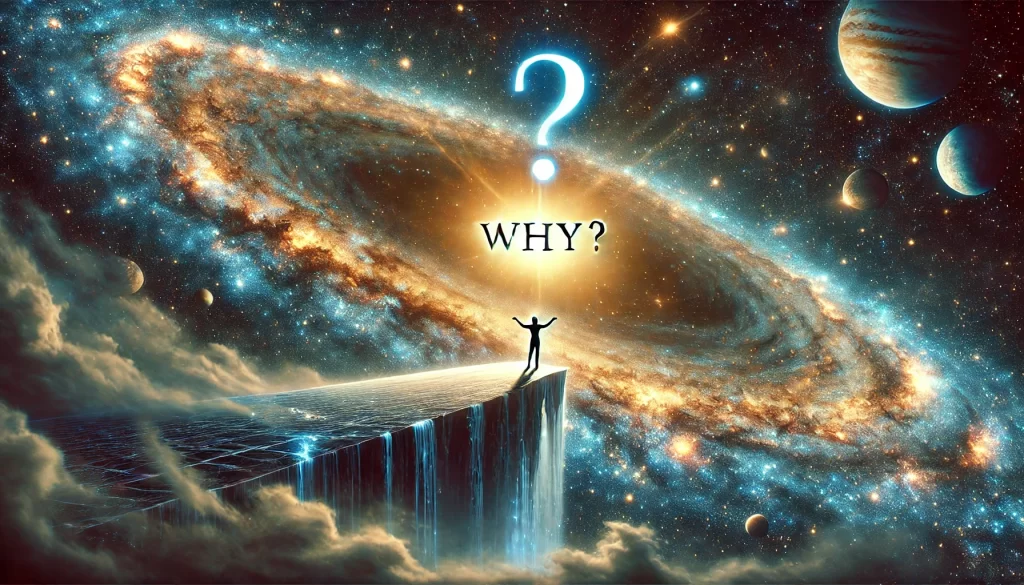
The Inquiry of Suffering, Pleasure, and Existence
The poem invites us to ponder deep existential questions about the nature of life, suffering, pleasure, and the interconnectedness of existence. It challenges us to reflect on the reasons behind life’s dualities and our perception of them.
The Duality of Suffering and Pleasure
The initial questions pose a fundamental inquiry into the rationale of a life source allowing both suffering and pleasure. It suggests a quest to understand the purpose behind experiencing extremes and whether there’s an inherent value judgment between the two.
The Perception of Good Versus Bad
The poem then questions the concept of betterment, probing why a life source—or we as extensions of it—would differentiate between suffering and pleasure, deeming one superior to the other. It’s an exploration of our own beliefs and how they shape our perception of life’s experiences.
The Illusion of Separateness
A pivotal turn in the poem is the contemplation of separation—why would the source of life imagine us as distinct from itself? It delves into the idea of individuality as an imagined construct and questions the notion of separateness within the broader spectrum of existence.
Existence as an Act of Imagination
The poem culminates with the suggestion that the act of questioning, and indeed the entire construct of our individual selves, may be a playful act of imagination by the source of life. It posits that our inquisitiveness and our perceived individuality might simply be expressions of life’s imaginative essence.
“We are not human beings having a spiritual experience. We are spiritual beings having a human experience.” – Pierre Teilhard de Chardin
A Poem of Cosmic Inquiry
In the vast expanse where stars are birthed,
Questions linger of our place on Earth.
Suffering and joy, the dual threads,
Woven by the source through which all is led.
Why judge the strands of life’s grand weave?
In the source’s eye, do we truly believe
That separation is our definitive state,
Or could it be just a cosmic trait?
In the questioning, a revelation bright,
We are the source, in questioning’s delight.
In life’s grand play, we are actors and script,
In the divine imagination, our roles adeptly equipped.
We invite contemplation on these musings of life’s existential queries and the nature of our existence.
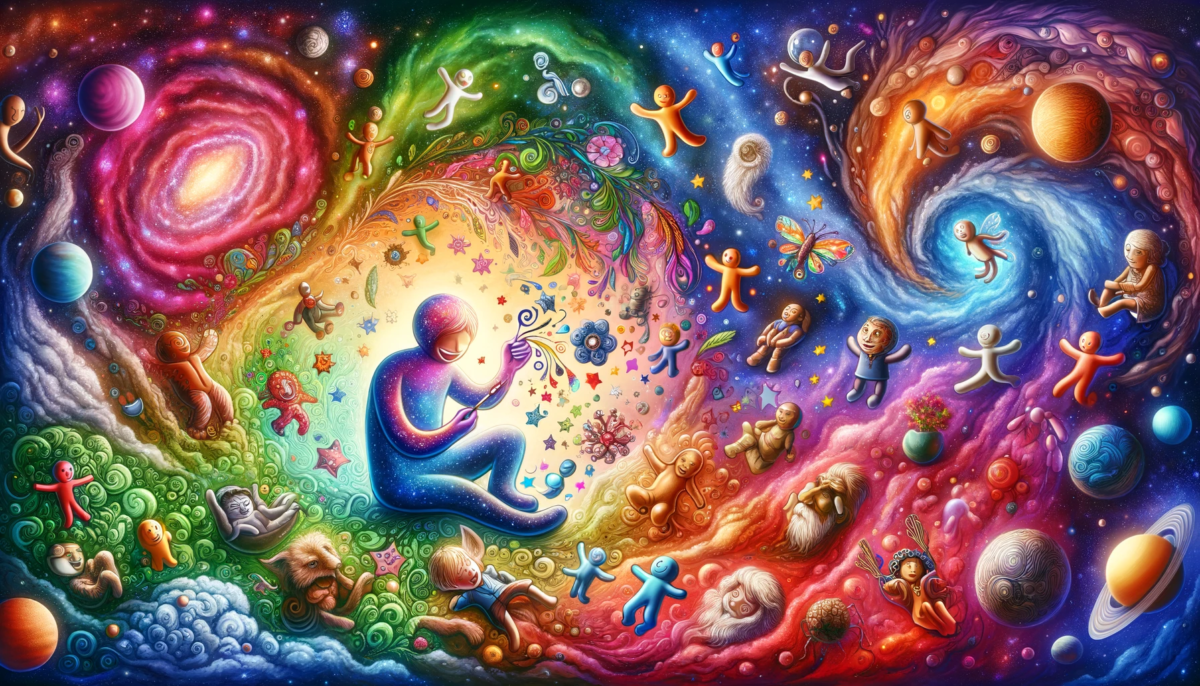
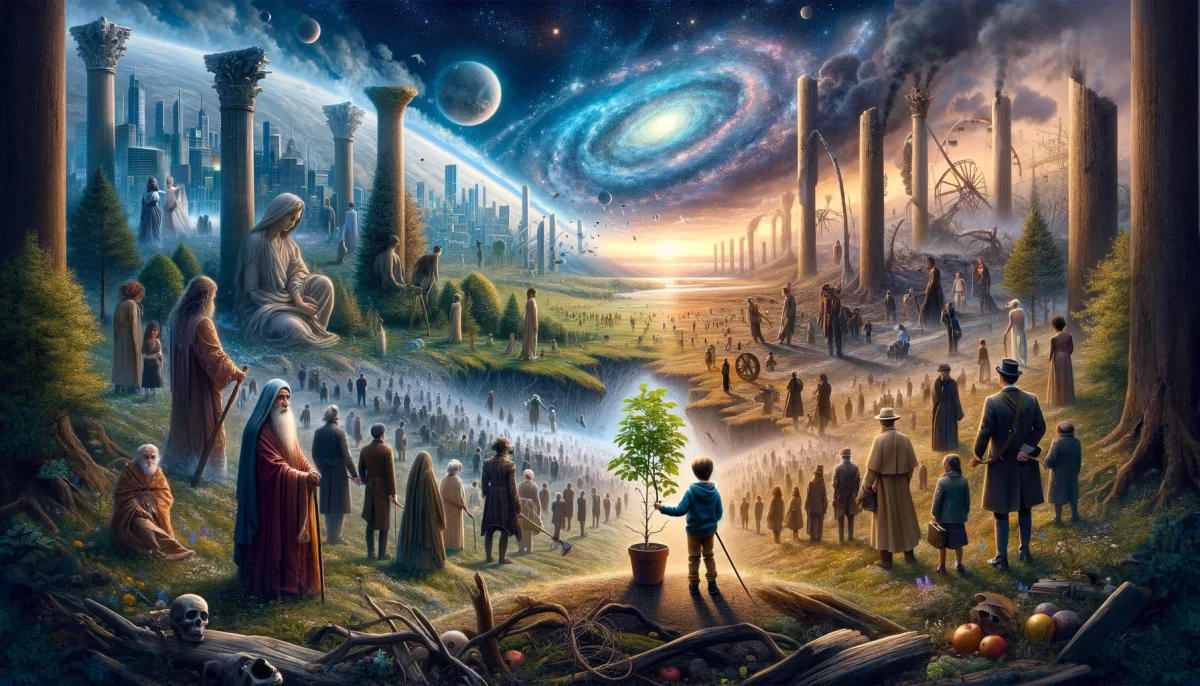
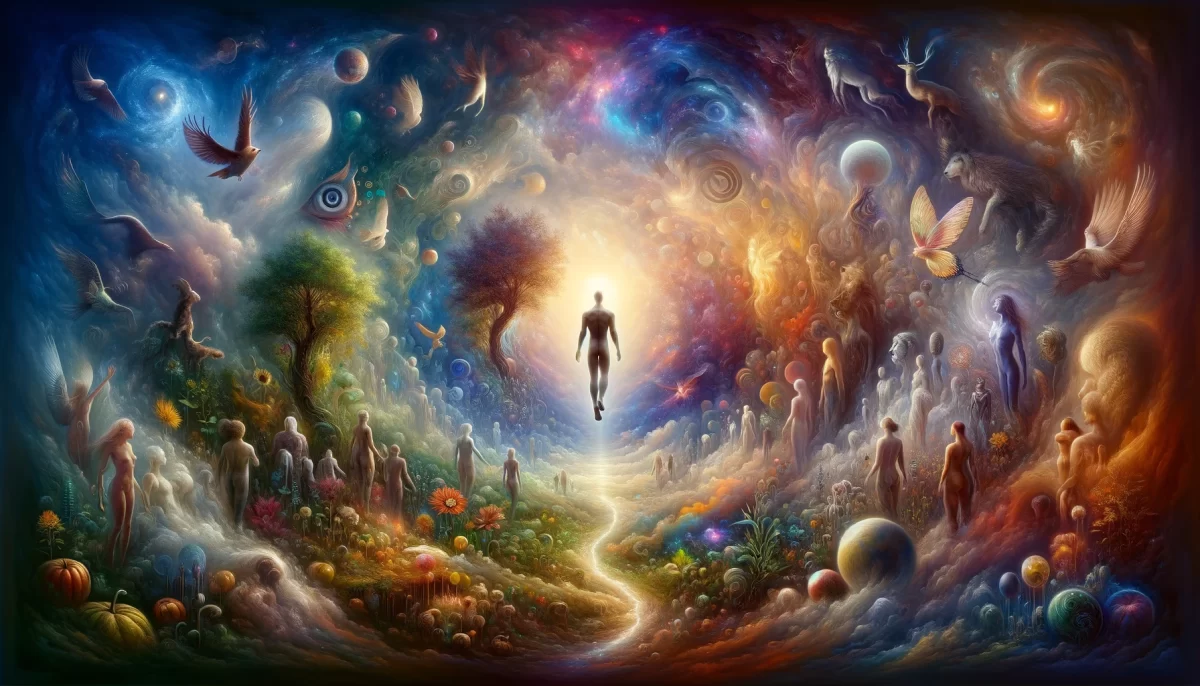
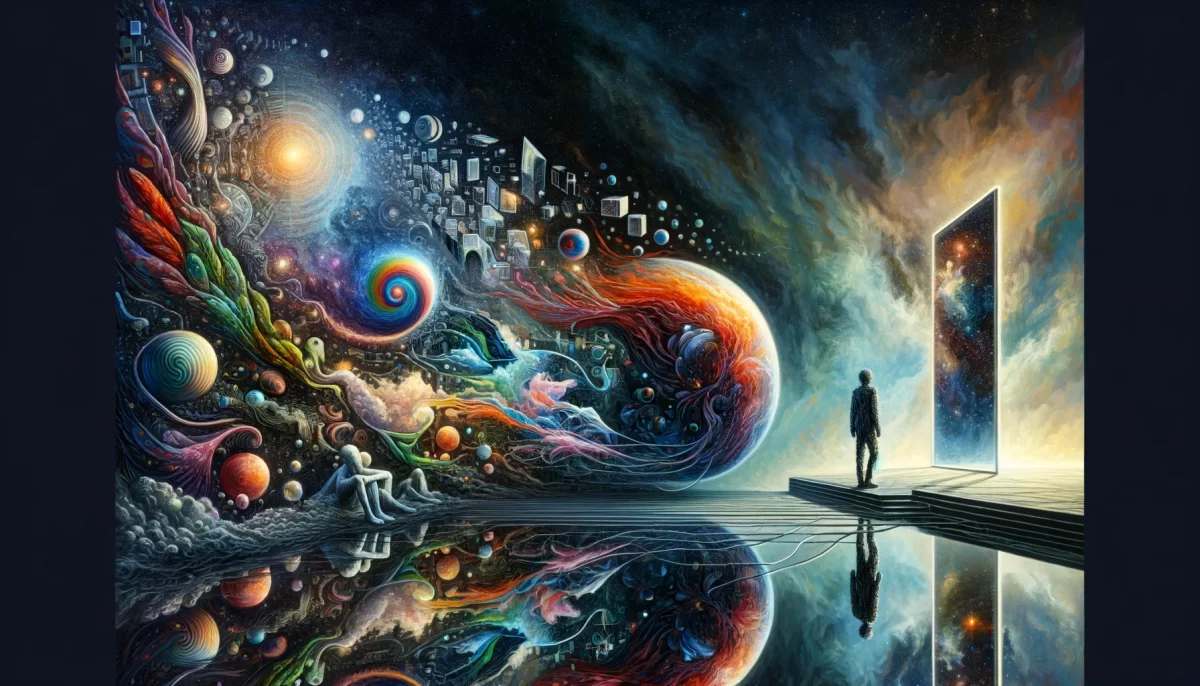
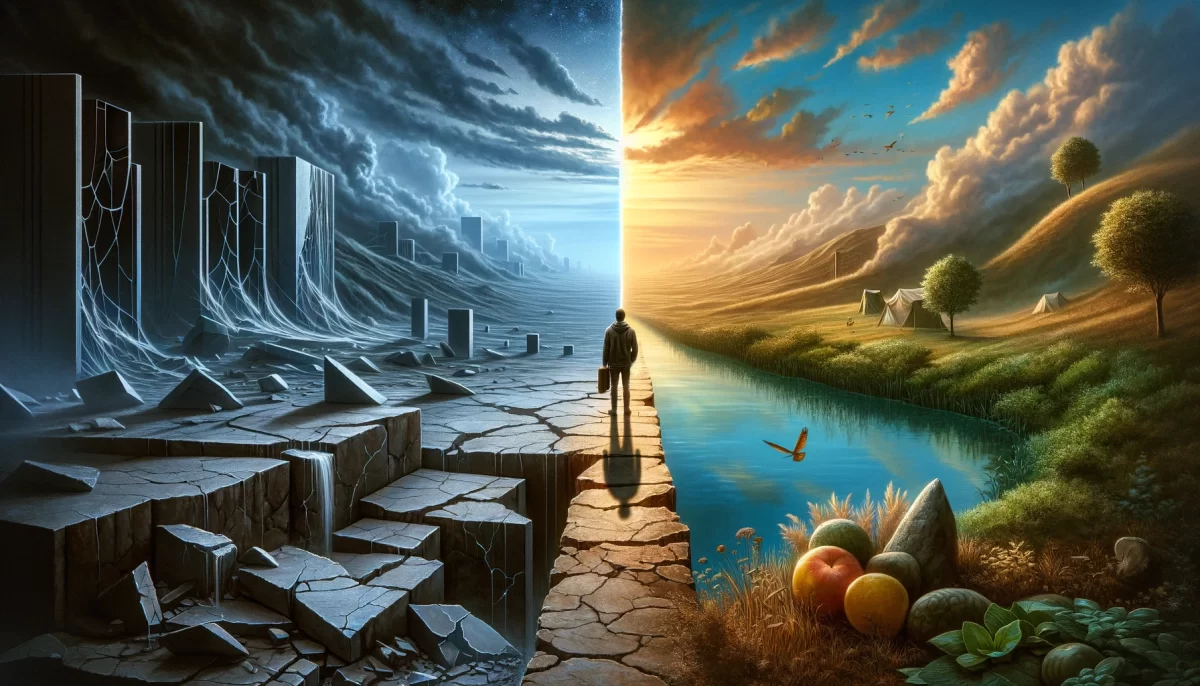

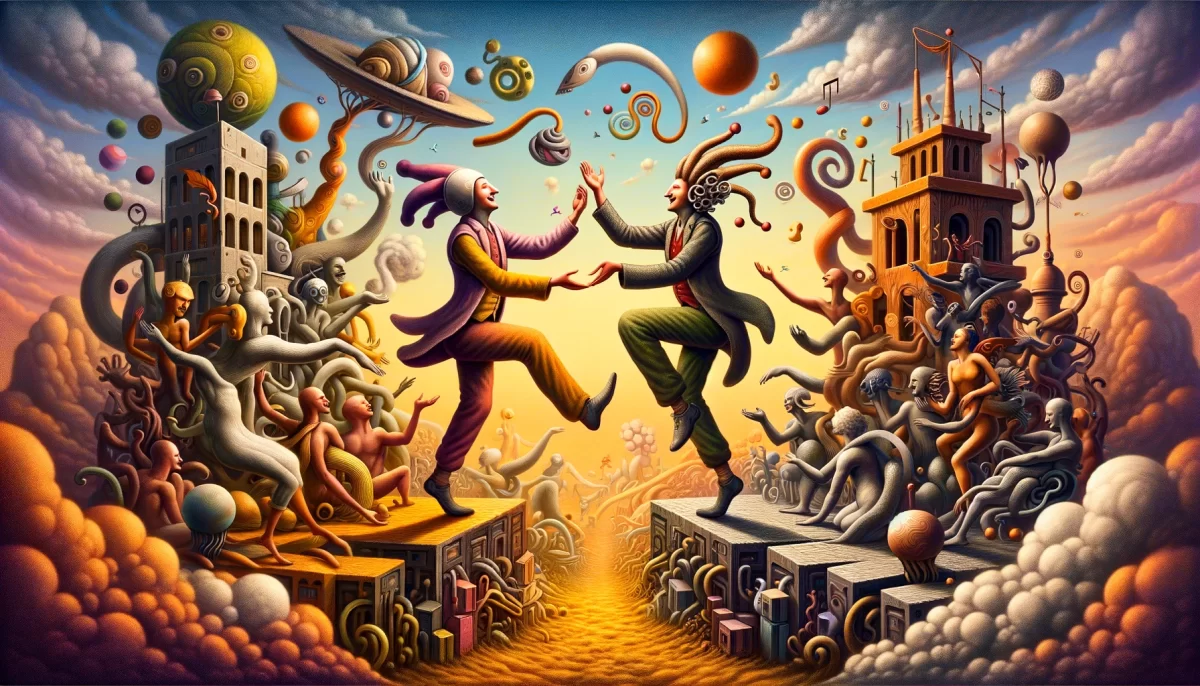

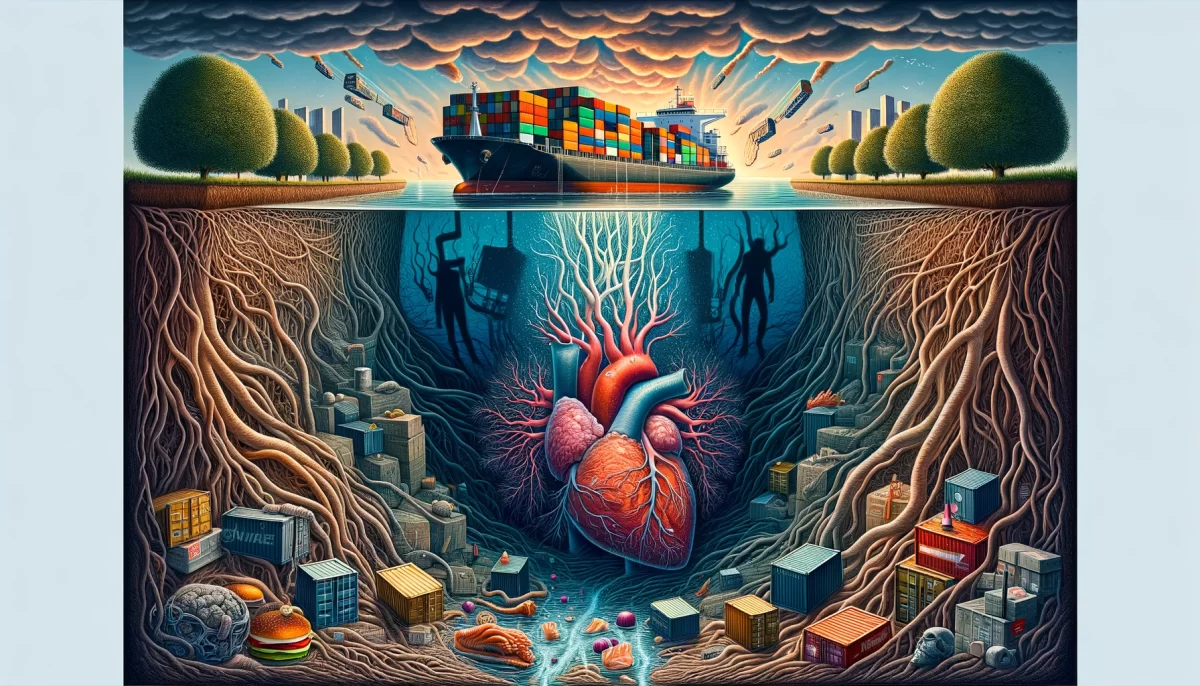
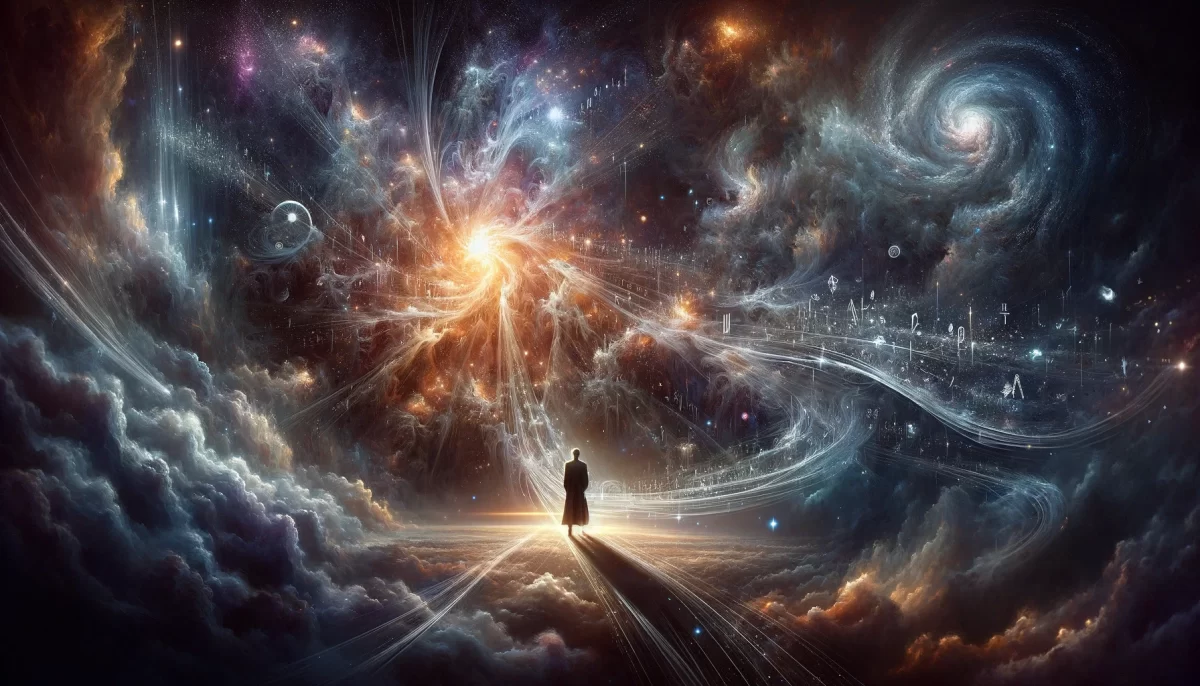
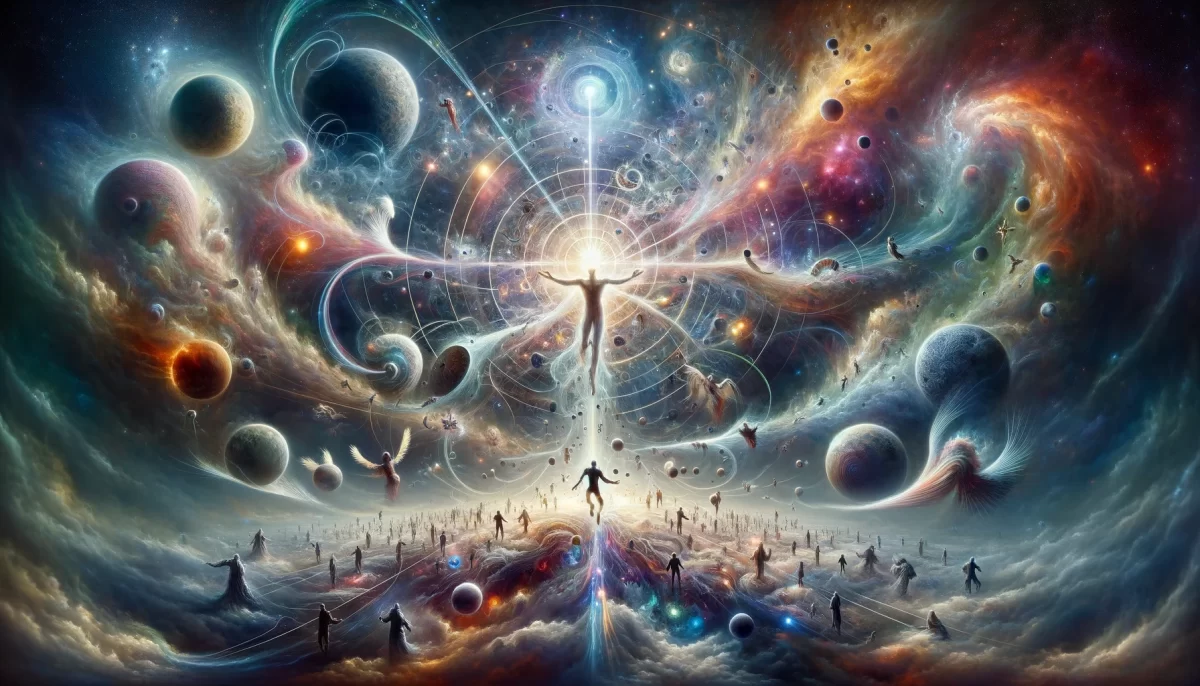
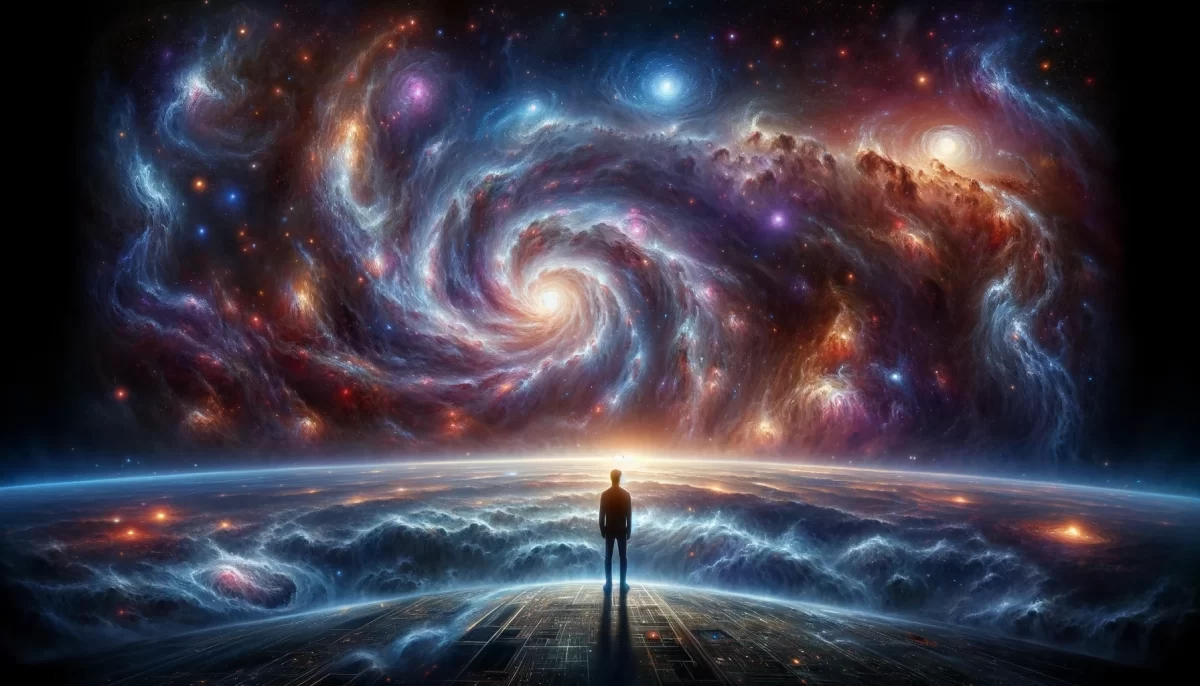
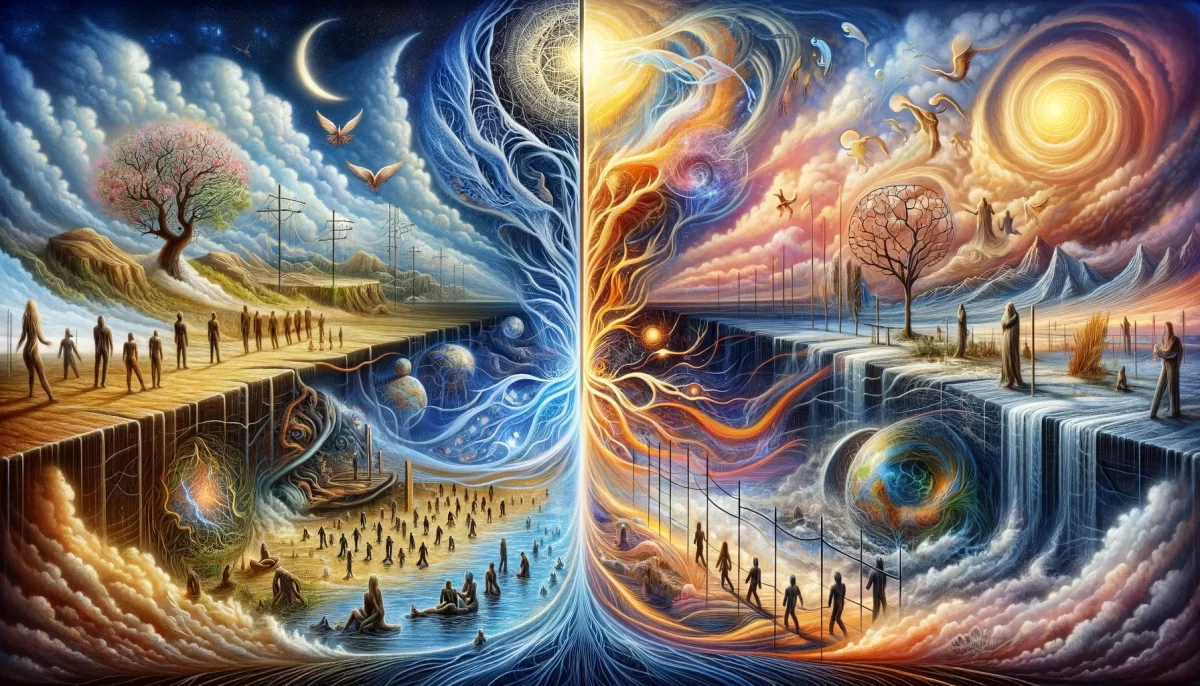
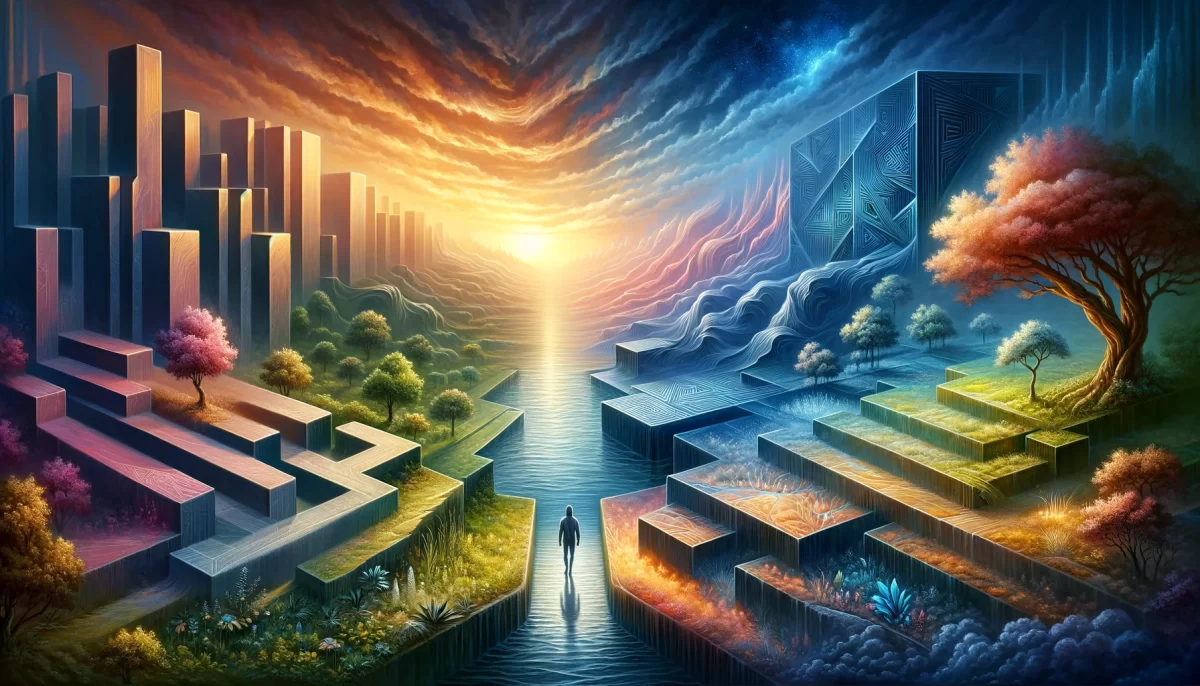
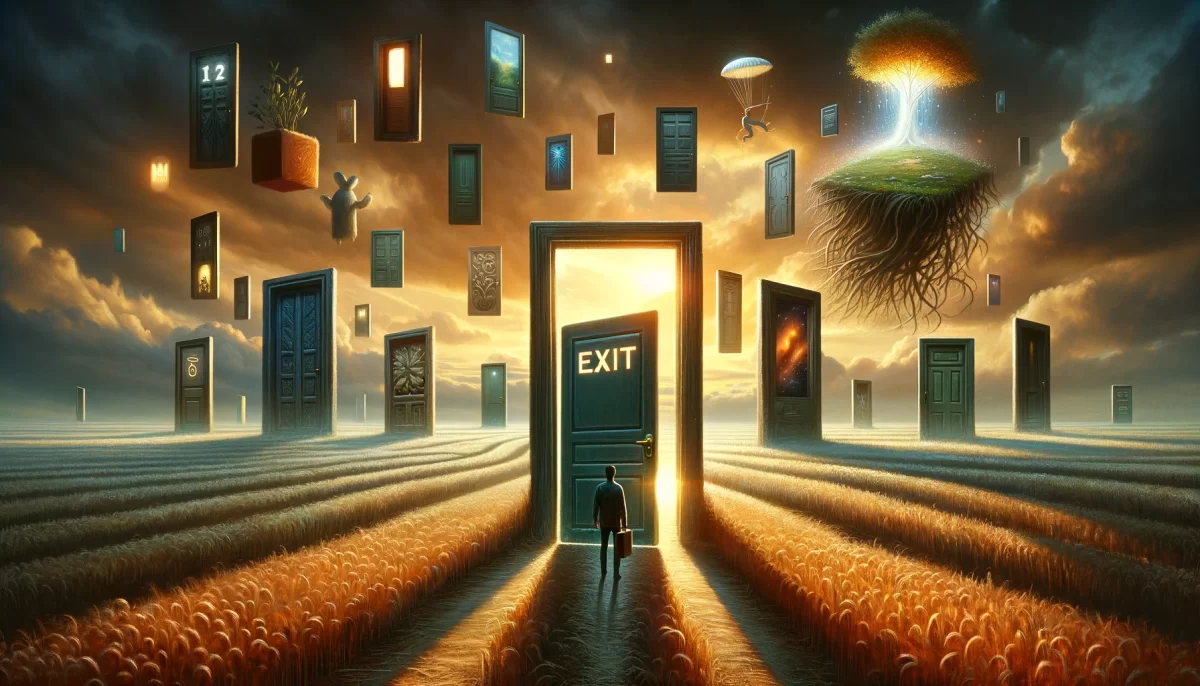
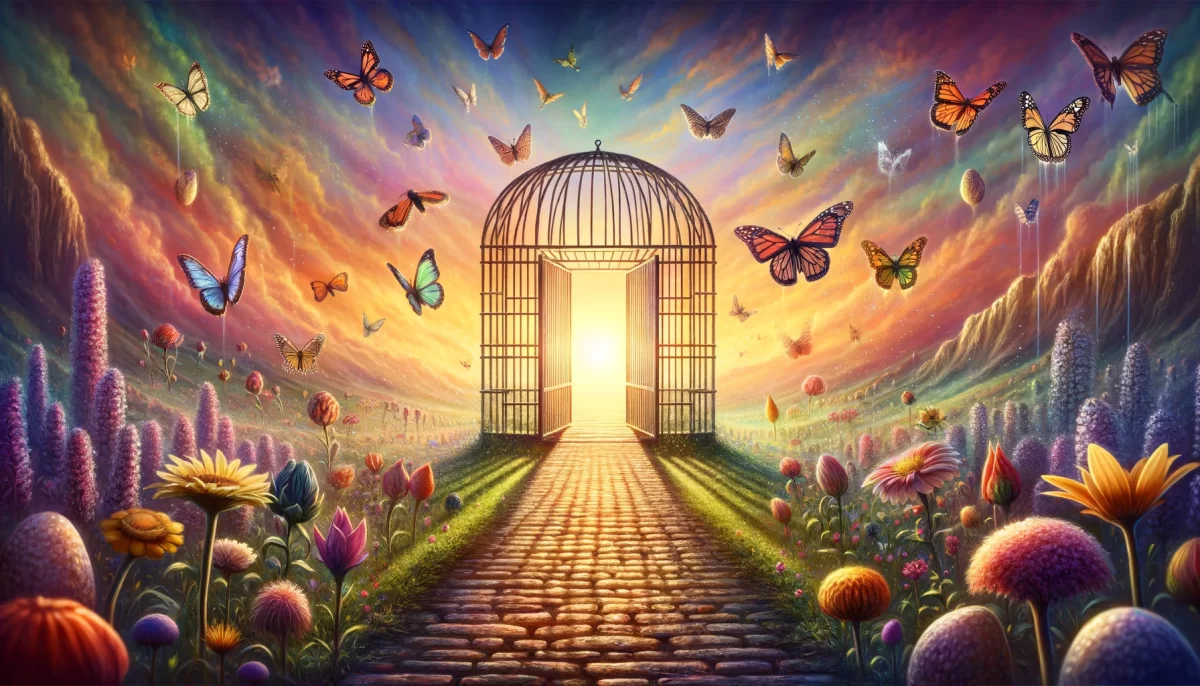
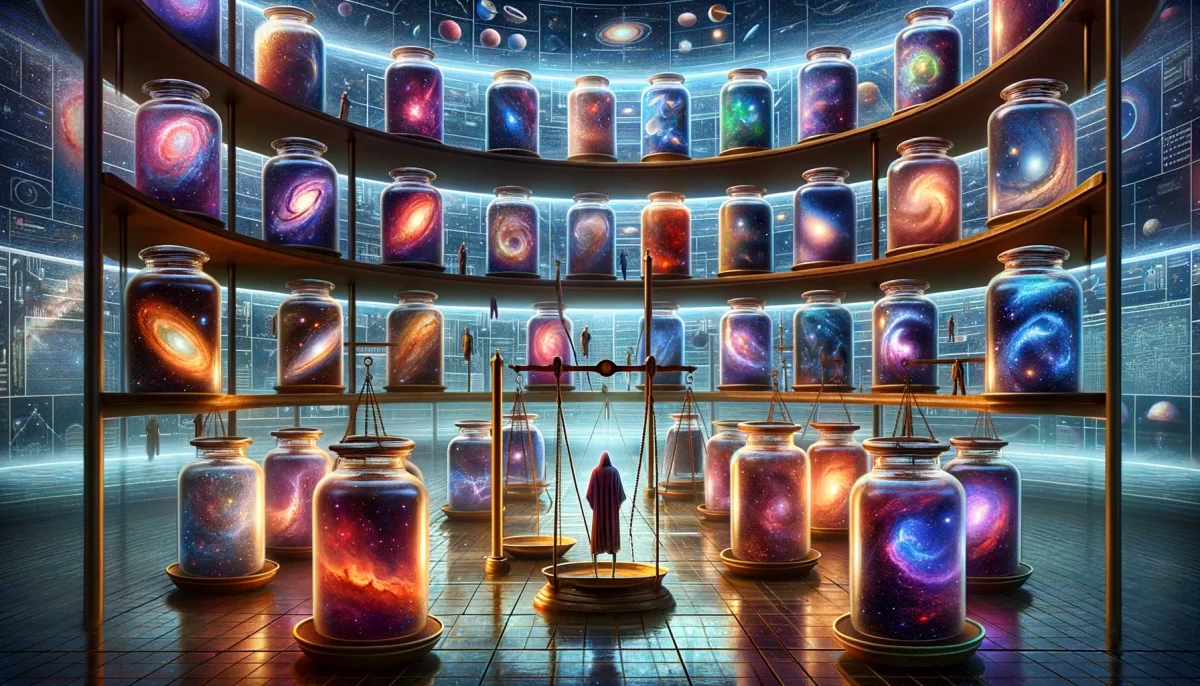



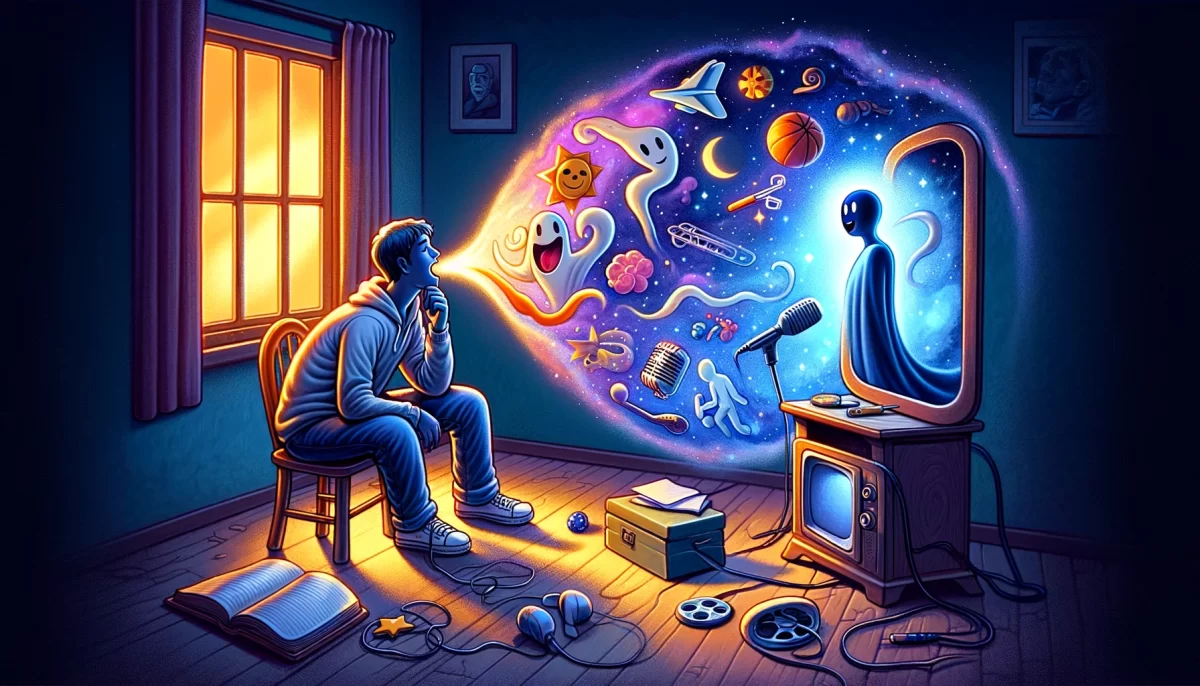
Leave a Reply